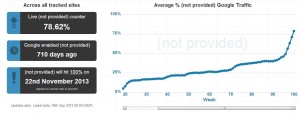Over at our research project I’ve been brooding on the conspiracy theories surrounding what happened to Building 7 in 9/11, and then fell to thinking about frame 313 of the famous Zapruder film of the assassination of JFK (which, at least until the advent of YouTube must have been the most-watched home movie in history). Here’s how Ron Rosenbaum, writing in the Smithsonian Magazine, summarises the key sequence in the film:
As the motorcade approaches, we see JFK’s car emerge from behind a sign that had been temporarily blocking the view. Suddenly, we see JFK clutch his throat. Jackie leans over to attend to him. An instant later, in Frame 313, it looks like a lightning bolt strikes JFK’s head. We see it blown up and thrown back. Jackie frantically crawls over the rear seat of the open car and climbs onto its rear deck grasping at something that has been described as a piece of her husband’s shattered skull. If Frame 313 is the forensic peak of the Zapruder film, this sight is the almost-unbearable emotional heart of it.
Rewind to Frame 313: The visceral impression that the blast came from in front of JFK and blew his head backward is powerful. There have been arguments that this is a kind of optical illusion—the most convincing to me being that JFK had been hit from behind after the previous frame, 312, slamming his chin forward to his chest, and his head was rebounding backward in Frame 313.
And it would be so much easier to dismiss the impression of a frontal shot as an illusion, because otherwise you’d have to doubt the conclusion of the Warren Commission that Lee Harvey Oswald, who was positioned behind the president, was the lone gunman.
But it would be a dozen years before most of the world would see Frame 313.
What brought Building 7 to mind was the parallel with the critical frames in the Zapruder film: any lay observer of the Building 7 collapse would probably conclude that it must have been an example of controlled demolition; and I guess that most lay observers of that awful moment in the Zapruder film would conclude that the shot must have come from the front rather than from the rear — and therefore that there must have been more than one gunman.
And here we come to one possible explanation for why some conspiracy theories can be so compelling: it is that non-conspiratorial explanations seem so implausible or far-fetched that the most rational approach is to reject them. And at this point I came on this intriguing short film by Errol Morris, the documentary-maker who won an Oscar for The Fog of War, his film about Robert MacNamara and the Vietnam War. Morris was the guy (I think) who first noticed that just as the motorcade reached the point where the President was shot, there was a man standing under a black umbrella (this on a brilliantly sunny morning), and this observation led to some pretty arcane conspiracy theories. But I will let him tell the story in his own words.
The JFK assassination is probably the most inquired-into killing in history. But intensity of re-examination can have various results. As John Updike observed in the New Yorker of December 9, 1967 when reviewing some of that re-examination,
“We wonder whether a genuine mystery is being concealed here or whether any similar scrutiny of a minute section of time and space would yield similar strangenesses – gaps, inconsistencies, warps, and bubbles in the surface of circumstance. Perhaps, as with the elements of matter, investigation passes a threshold of common sense and enters a sub-atomic realm where laws are mocked, where a person is how the life-span of beta particles and the transparency of neutrinos, and where a rough kind of averaging out must substitute for the absolute truth. The truth about those seconds in Dallas is especially elusive; the search for it seems to demonstrate how perilously empiricism verges on magic.”
Or, as Errol Morris puts it in the film:
“If you put any event under a microscope you will find a complete dimension of completely weird, incredible things going on. It’s as if there’s the macro level of historical research with things sort of obeying natural laws, the usual things happen, unusual things don’t happen. And then there’s this other level where everything is really weird.”
I like his concluding riff:
“What it means is if you have any fact which you think is really sinister, right, is really obviously a fact which can only point to some really sinister underpinning, forget it, man. Because you can never on your own think of all the non-sinister, perfectly valid explanations.”
It’s also worth noting that in 1976, after frame 313 was finally shown on US TV, the House of Representatives set up a special inquiry to re-examine the assassinations of JFK and Martin Luther King. In relation to the Kennedy assassination, the House Select Committee on Assassinations concluded that there was a second gunman on the grassy knoll in Dallas and that JFK was therefore killed by a conspiracy. But that conclusion was largely based on acoustic evidence which was later challenged and discredited.
An interesting factoid: the part of the Guardian office in London where the investigative reporters’s desks are clustered is sometimes irreverently referred to as “the grassy knoll”.


